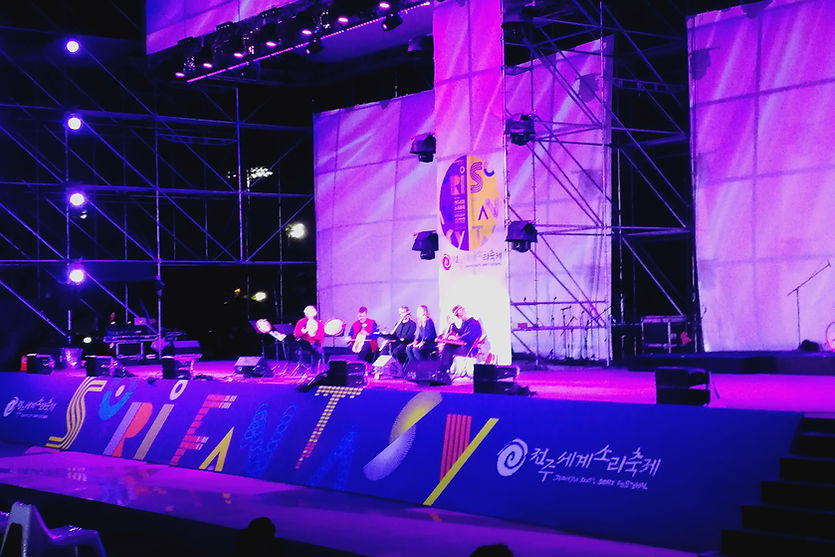

Le chant des Femmes en Méditerranée
La traversée...intemporelle, universelle, échappée belle...
Comme l'infinie ondulation des vagues, l'Histoire se répète...
MESOGEIOS est une création pour la paix en Méditerranée, en hommage à ceux dont la traversée fut d'une autre dimension.
ODO remonte le temps, et nous plonge au XIVème siècle, à Ravenne en Italie, haut lieu stratégique et d'échanges au Moyen-âge. Dans un contexte marqué par des luttes, il nous invite à un voyage en Méditerranée, à la rencontre de femmes et de leurs chants.
Ces musiques sont l'expression féminine d'expériences de vie universelles, jaillissant d'un autre temps, dont la sincérité de leurs messages demeure très actuelle.
Avec MESOGEIOS, ODO Ensemble crée un son unique en faisant se rencontrer rassemble des musiciens de diverses horizons avec leurs instruments traditionnels.
Il parcourt la Méditerranée avec ces chants anciens et traditionnels qui ont traversé l'Antiquité puis le Moyen-âge, au cours d'échanges commerciaux et des différentes invasions : Musique de l'Italie avec des extraits du Codex Rossi, saltarelle, tarentelle, chants de troubadours, musique arabo-andalouse, chant araméen, chants traditionnels corses, sépharades, berceuse égyptienne, chant turc, musique grecque, et syrienne...
Des civilisations se rencontrent du Nord au Sud, de l'Orient à l'Occident, d'hier à aujourd'hui. Au gré des vents, le chant des roses nous embarque...
Claire Merigoux, 2017
Preface by Alain Weber, extract from the CD booklet of ODO Ensemble - MESOGEIOS - Le Chant des Femmes en Méditerranée
"Created by Claire Merigoux, the ensemble "Odo" refers to Saint Odoe, this musician and Benedictine monk who was de_cc781905-5cde-3194-6193-6bb3b-badcf58d_926 to 942 the second abbot of Cluny. This very idea of "musician monk" evokes a time when pilgrims of the soul, poets and wandering mystics, crossed mountains, seas and deserts in search of knowledge. They reflected this idea of "timeless, universal crossing..." expressed by the "Mesogeios" project.
The sacralization of nature and life that nourished the imagination of a traditional world, faced with over-cleared lands, fled like a hunted beast. It is in music and poetry that the notion of the sacred seems to take refuge more nowadays, where plenitude and transcendence are still expressed.
The Odo ensemble, in its many creations, draws the map of an ancient world populated by myths, tales (like the Turkish Sephardic song "El Rey de Francia"), love stories or tragedies that have become legends thus defying the limits of the human condition.
Faced today with the narrowing of this invisible geography, it is towards the hypnotic brilliance of the Orient that we often turn, forgetting the epicenter represented by “Mare Nostrum” “our” Mediterranean sea bordered by 3 continents.
Through these women's songs, from the Langue d'Oc to the Aramaic language, from Constantinople to the Qadisha Valley in Lebanon, from Sephardic Andalusia at the gates of Istanbul, from the Egyptian Nile to the Greece, from Corsica (where this project was born in Pigna) to Ravenna, a strategic high place and exchanges in the Middle Ages, Mesogeios landed us on shores where ancient or bergers, intertwine in an ode to life, its beauty and its mysteries.
Would it be caricatural to say that thanks to a wide sphere of oral transmission and a great finesse of inspiration, beyond a certain complex symbolic jumble reshaped over the centuries in the light of Christian spirituality, a particularly feminine incentive knew how to carry a heritage where sacred, passion, determination and tenderness coexist?
In this same spirit of transmitting a heritage that has shaped our history and our identity, this wide range of expressions takes us from the power of possession rituals such as tarantism (evoked in the famous song "Tarantella del Gargano") to the tenderness of universal lullabies like the Egyptian one of “Nami Nami” or the Corsican one of “O Ciucciarella”"
Alain Weber, 2021
